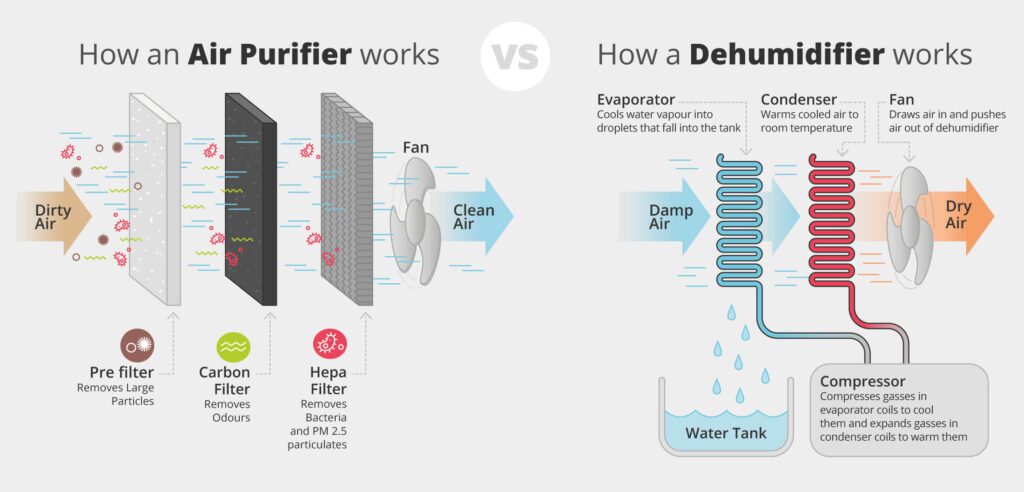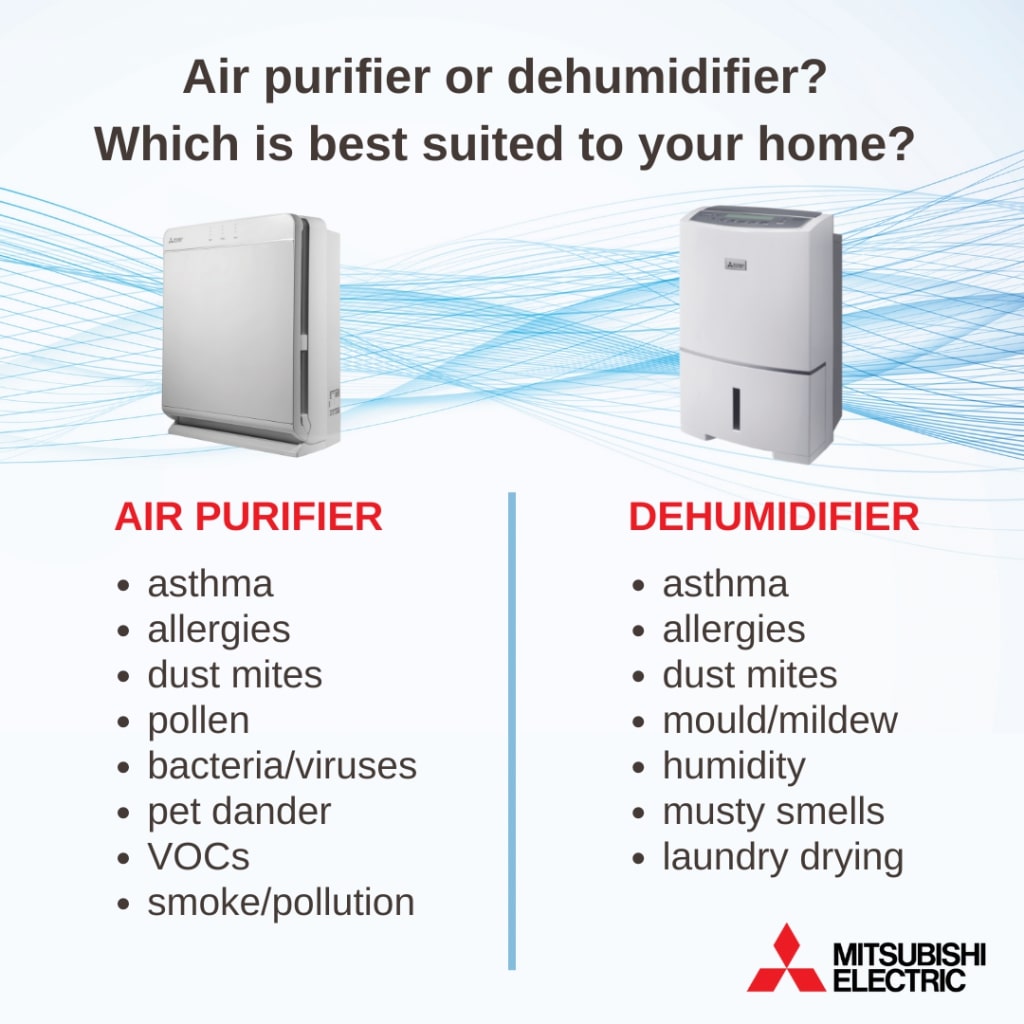If you’re dealing with mold issues in your home, you might be wondering whether an air purifier or a dehumidifier is the better solution. While both devices are designed to improve indoor air quality, they tackle the problem from different angles. In this article, we’ll explore the benefits of each and help you determine which one is the right choice for effectively combating mold in your living space. So say goodbye to mold and hello to a healthier, cleaner home!

Introduction
When it comes to addressing mold growth in your home, it’s important to consider the best course of action. Mold is not just unsightly; it can also pose serious health risks and impact the indoor air quality of your living spaces. In this article, we will explore the effectiveness and benefits of two common solutions: air purifiers and dehumidifiers. By understanding how these devices work and their impact on mold prevention, you can make an informed decision to ensure a healthy and mold-free environment in your home.
Understanding the Problem
Before we delve into the comparison between air purifiers and dehumidifiers, let’s first understand what causes mold growth. Mold thrives in environments with excessive moisture and poor ventilation. Common sources of moisture include leaks, condensation, and high humidity levels. When left unchecked, mold can quickly spread and release mold spores into the air, leading to various health risks and deteriorating indoor air quality.

Air Purifiers
Air purifiers are devices designed to remove contaminants from the air, including mold spores. These devices work by utilizing filters, such as HEPA filters, to trap and remove particles as small as 0.3 microns. Some air purifiers also incorporate additional technologies like activated carbon filters and UV-C light to further enhance their effectiveness in purifying the air.
There are different types of air purifiers available, including portable units and whole-house systems. Portable air purifiers are typically smaller and can be easily moved from room to room, while whole-house systems are integrated into the HVAC system and provide whole-home coverage. Both types have their advantages and can effectively remove mold spores from the air.
Air purifiers not only address mold spores but also remove other airborne pollutants, such as dust, pollen, pet dander, and volatile organic compounds (VOCs). This makes them beneficial for individuals with allergies, asthma, or other respiratory conditions.
Dehumidifiers
Dehumidifiers, on the other hand, target the root cause of mold growth by reducing moisture levels in the air. These devices work by extracting excess moisture from the air, typically by condensing it on a cold surface or using a desiccant material. By maintaining an optimal humidity level (around 45-50%), dehumidifiers effectively discourage mold growth and create a less favorable environment for mold spores to thrive.
Similar to air purifiers, dehumidifiers come in different types, including portable units and whole-house systems. Portable dehumidifiers are ideal for single rooms or smaller spaces, while whole-house systems integrate with the HVAC system to provide comprehensive moisture control throughout the entire home.
In addition to preventing mold growth, dehumidifiers also offer benefits such as reducing musty odors, minimizing the chance of condensation on windows and walls, and helping to preserve furniture and other belongings from moisture damage.

Factors to Consider
When choosing between an air purifier and a dehumidifier for mold control, there are several factors to consider. These factors will help you determine the most suitable solution based on your specific needs and circumstances.
The severity of the mold issue is an important consideration. If you’re dealing with a minor mold problem or occasional mold growth, an air purifier may be sufficient. However, if you have consistently high humidity levels or a significant mold infestation, a dehumidifier would be more effective in reducing moisture and preventing further mold growth.
The size of the space is another factor to think about. Portable air purifiers and dehumidifiers are ideal for smaller rooms or localized mold issues, while whole-house systems are better suited for larger areas or extensive mold problems.
Budget considerations also play a role in decision-making. Both air purifiers and dehumidifiers come in a range of prices, so it’s important to determine your budget and prioritize the features that matter most to you.
Maintenance requirements and energy consumption are additional aspects to think about. Air purifiers typically require filter replacements, and some models may have additional maintenance needs like cleaning or replacing UV-C bulbs. Dehumidifiers require periodic cleaning, filter maintenance, and drainage of collected water. Considering these upkeep tasks and the energy consumption of each device will help you make an informed decision.
Choosing the Right Solution
To select the best solution for your specific mold issue, it’s crucial to identify the primary problem you’re facing. If excess moisture is the root cause of the mold growth, a dehumidifier should be your priority. By reducing moisture levels, you will create an environment that is unfavorable for mold growth. However, if you’re mainly concerned about removing mold spores from the air, an air purifier will be more beneficial.
In some cases, combining both an air purifier and a dehumidifier may provide the most effective mold control. By addressing both mold spores in the air and excess moisture, you can tackle the problem from multiple angles and ensure comprehensive mold prevention.
When considering long-term solutions, it’s important to address the underlying causes of mold growth. This may involve fixing any leaks, improving ventilation, and implementing moisture control strategies in areas prone to excessive moisture. Taking these steps alongside using air purifiers or dehumidifiers will help maintain a mold-free environment in your home.

Installation and Maintenance
Proper installation and maintenance are key to ensuring optimal performance from both air purifiers and dehumidifiers.
For air purifiers, proper placement is vital. Portable units should be positioned in rooms where you spend the most time or where mold growth is a concern. Ensure that the air purifier has sufficient airflow and is not obstructed by furniture or walls. Whole-house systems should be installed by professionals who can integrate them into your HVAC system.
Maintenance tips for air purifiers include regularly replacing filters according to the manufacturer’s instructions. It’s important to clean the air purifier’s exterior and internal components to prevent the buildup of dust and other particles that can hinder its performance. Additionally, if your air purifier utilizes an activated carbon filter or UV-C light, follow the recommended maintenance guidelines for those components.
Similarly, dehumidifiers require proper placement and regular maintenance. Place portable dehumidifiers in areas with high humidity or mold growth, ensuring they have adequate space for airflow. Whole-house systems should be professionally installed to ensure optimal performance.
Maintenance for dehumidifiers includes cleaning the water collection tank regularly and replacing or cleaning the air filter as recommended by the manufacturer. Additionally, drain any collected water as needed and inspect the unit for any signs of damage or wear.
Expert Opinions
To gain further insights into the effectiveness of air purifiers and dehumidifiers for mold control, it’s important to consider expert opinions. Mold remediation professionals often recommend a multi-faceted approach that includes addressing moisture issues while simultaneously improving air quality through the use of air purifiers. By tackling both aspects, you can achieve better mold prevention and overall indoor air quality.
Hearing from HVAC specialists can also provide valuable insights. These professionals can assess your specific situation, recommend appropriate dehumidifier systems, and even integrate whole-house air purifiers into your existing HVAC system for comprehensive mold control.
Research-based recommendations support the use of both air purifiers and dehumidifiers for mold prevention. Studies have shown that air purifiers with HEPA filters effectively reduce airborne mold spores. Similarly, research has demonstrated that dehumidifiers can successfully reduce moisture levels and inhibit mold growth.

Case Studies
Real-life examples showcase the effectiveness of both air purifiers and dehumidifiers in mold control. In one case study, a family living in a humid climate struggled with recurring mold growth. By combining the use of portable air purifiers with dehumidifiers, they were able to maintain a mold-free environment and alleviate respiratory symptoms caused by mold exposure.
Another success story features a homeowner who experienced persistent mold infestation in their basement. After installing a whole-house dehumidifier, they noticed a significant reduction in mold growth and musty odors. Combining the dehumidifier with targeted air purifiers further improved the overall air quality in their home.
Combining both air purifiers and dehumidifiers has also proven effective in mold control. In a case study involving a water-damaged home, the use of air purifiers and dehumidifiers together resulted in a dramatic reduction in mold spore levels and significantly improved indoor air quality.
Conclusion
In conclusion, both air purifiers and dehumidifiers offer effective solutions for mold control and improving indoor air quality. The choice between the two depends on various factors such as the severity of the mold issue, the size of the space, budget considerations, and maintenance requirements. Understanding the primary problem you’re facing, considering long-term solutions, and seeking expert opinions can guide you in making an informed decision.
Remember that proper installation and maintenance are essential for the optimal performance of both air purifiers and dehumidifiers. By selecting the right solution and implementing appropriate measures, you can successfully address mold growth, improve air quality, and create a healthier living environment for you and your loved ones.